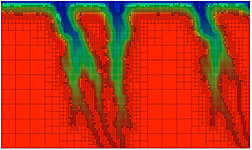- Number 415 |
- June 9, 2014
Simulation capability illuminates geothermal energy potential

FALCON is being used to model how the
injection of cold water might increase the
permeability, and hence the energy
production, at one geothermal site.
Geothermal energy could become a cost-competitive source for electricity in the very near future with the help of a subsurface modeling program designed by researchers at DOE's Idaho National Laboratory. The Fracturing and Liquid CONvection (FALCON) code can analyze various facets of the subsurface physics behind geothermal energy extraction.
Traditional geothermal energy can be accessed only at rare sites where subsurface heat, water and permeable rock converge. However, Enhanced (or Engineered) Geothermal Systems (EGS) can be built so that they add fluid to the system, as well as increase rock permeability via techniques such as fracturing. Thus, an EGS site only needs a location with subsurface heat. At that point, FALCON can swoop in to optimize the process.
FALCON helps maximize the performance of EGS sites by providing developers with a thorough understanding of how the heat, fluid, chemical and mechanical components interact underground.
Robert Podgorney and Hai Huang began developing FALCON in 2009 as a quest for a simulation code that could provide EGS with better information about the heat trapped in the Earth’s crust. Existing simulation programs at the time could look only at individual physical phenomena. The FALCON code couples mathematical models governing multiple physical systems and solves the equations simultaneously using INL’s MOOSE simulation platform.
By the time Podgorney and Huang completed FALCON, they had created a program that enables faster, simpler and more comprehensive simulation of subsurface physics. FALCON even simplifies the computational process, allowing simulations to run without the need of a supercomputer.
Today, geothermal research groups from around the world are using FALCON to evaluate their site data.[Nicole Stricker, 208.526.5955,
nicole.stricker@inl.gov]
